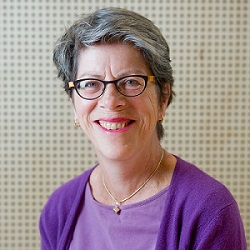Elly Albers
The Expert in the Spotlight feature gives you the chance to interact one-on-one with our Ask the Expert-section. The feature also provides interesting and insightful comments regarding the subjects mentioned above, in-depth content and exclusive Q and A's.
December 2016

Featured Expert / Area of focus:
For more than nine years Mercator's Expert in the Spotlight feature was in the capable hands of Mercator's information specialist Elly Albers. But all good things come to an end, and Elly will leave Mercator to retire next month. The Mercator team will sorely miss her and take over her many duties as best as possible. The final Expert in the Spotlight of 2016 is about Elly herself and her work at Mercator Research Centre.
Face to face with Elly
What is your professional background, and how did you come to work at Mercator Research Centre, and the Fryske Akademy?
I was educated as assistant-librarian and youth-librarian. I started working in 1972 in the public library in Utrecht. Afterwards I worked as museum-librarian at the Tropenmuseum in Amsterdam and librarian at De Horst University in Driebergen. In 1998 I moved to Leeuwarden and became a school librarian at a school for secondary education.
A friend of my husbands daughter got me a job at Mercator Research Centre. He was an educational researcher there. The library of Mercator Research Centre, which started in 1978, had a huge number of titles in her catalogue, which needed to be filed and I was given a temporary appointment.
How long have you worked there?
I have worked for Mercator Research Centre and for the Department of Social Sciences of the Fryske Akademy from February 2001 December 2016.
Can you tell us about the projects you have worked on?
Digybyb-project
From 2003-2005 we began a Digital Library on European Minority Languages: the Digibyb project was a pilot study on digital storage and retrieval of data concerning minority languages in Europe. The idea was to collect data in a digital library, i.e. sources containing information and meta-data of sources, and organize it in such a way that users could search, find and read the data.
The collected data was to concern minority groups in Europe. The resulting digital library was supposed to encourage information exchange between European minority groups and to enhance the presence of these groups in the international digital community. The digital library was aimed at several user groups, such as scientists, students, teachers, journalists, policy makers, writers and interested laymen.
To realize the concept of a digital library, attention was first directed to the establishment of a digital library of Frisian, while enabling extension of the project towards other minority language libraries - or at least creating such a flexible concept that other digital libraries could easily be linked up with the Frisian pilot project.
&nb
Database of Experts
We created a database of experts (more than 600 experts), which offers an overview of expertise in the field of European minority or regional languages, bilingualism and multilingualism at school and at home, education, language learning, language policy and cultural participation in favour of linguistic diversity in Europe.
Which work are you most proud of and why?
I am most proud of the fact that in 2014 the library of Mercator Research Centre became situated in Tresoar, and that the collection also became important for Tresoar.
Multilingualism is a central topic for both Mercator and Tresoar. The Mercator library assists the researchers of Mercator Research Centre and the Fryske Akademy, but is also important for the Master Multilingualism of the University of Groningen. The Mercator library will also be an important source of information for the 11th Faculty of the University of Groningen, Campus Fryslân, which will be situated in Leeuwarden and offer classes on Multilingualism.
The catalogue of the Mercator Research Centre library has been integrated with the catalogue of Tresoar, which is now accessible worldwide.
Once a week I composed a newsletter Taalnijs fan Elly for my colleagues and relations, in which upcoming conferences, new issues of scientific journals, language news, links and other news, were announced.
Working in an academic environment is special and includes many activities such as collection-development, alerting colleagues to sources and literature, providing digital access, providing policy advice about new digital services to the management team, literature-research, keeping yourself up-to-date as librarian, being a hostess at international symposia for Mercator Research Centre. Too many activities to mention and I loved them all!
What, do you think, are the most interesting, new developments in the field of minority / lesser used languages?
The Internet and many related digital developments offer many opportunities for minority or regional languages all over the world to safeguard their cultural heritage and spoken languages using video, blogs, podcasts, open access etc.

